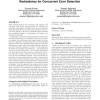Free Online Productivity Tools
i2Speak
i2Symbol
i2OCR
iTex2Img
iWeb2Print
iWeb2Shot
i2Type
iPdf2Split
iPdf2Merge
i2Bopomofo
i2Arabic
i2Style
i2Image
i2PDF
iLatex2Rtf
Sci2ools
137
click to vote
IEEEPACT
2006
IEEE
2006
IEEE
Self-checking instructions: reducing instruction redundancy for concurrent error detection
With reducing feature size, increasing chip capacity, and increasing clock speed, microprocessors are becoming increasingly susceptible to transient (soft) errors. Redundant multi-threading (RMT) is an attractive approach for concurrent error detection. However, redundant thread execution has a significant impact on performance and energy consumption in the chip. In this paper, we propose reducing instruction redundancy (the instructions that are redundantly executed) as a means to mitigate the performance and energy impact of redundancy. In this paper, we experiment with an decoupled RMT approach where the frontend pipeline stages are protected through error codes, while the backend pipeline stages are protected through redundant execution. In this approach, we define two categories of instructions — self-checking and semi self-checking instructions. Self checking instructions are those instructions whose results are checked for any errors when their “main” copies are execute...
Related Content
| Added | 11 Jun 2010 |
| Updated | 11 Jun 2010 |
| Type | Conference |
| Year | 2006 |
| Where | IEEEPACT |
| Authors | Sumeet Kumar, Aneesh Aggarwal |
Comments (0)

